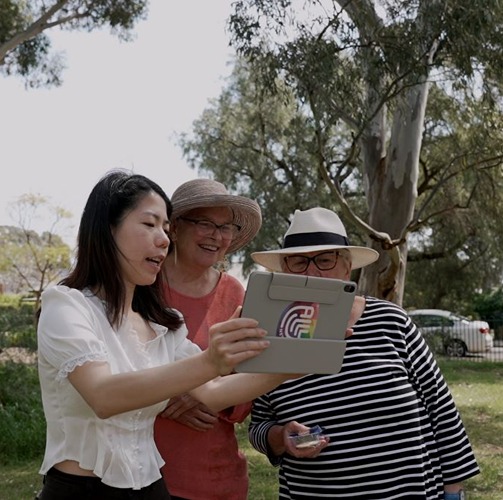06 November 2025

Dr Zinan Chen co-designing with older residents using AR tools.
As the need for age-friendly design in urban communities becomes ever more critical, an award winning University of South Australia research project is reshaping the design of urban green spaces, ensuring parks are more inclusive and welcoming for older residents.
Led by Dr Zinan Chen, Transforming to an Age-Friendly World used Virtual Reality (VR), Augmented Reality (AR), and Citizen Science to explore how co-design can lead to stronger communities and smarter design outcomes.
The UniSA PhD project was conducted in partnership with the City of Unley and Tract Consultants and was supported by South Australia’s Office for Ageing Well. It recently received three honours from the Australian Institute of Landscape Architects (AILA): the National Landscape Architecture Award, the People’s Choice Award, and the SA Award for Research, Policy and Communications.
Dr Chen’s research shows that when older adults are treated as co-creators rather than “consulted” participants, design priorities change.
“Their ideas led to new design priorities, like seats with good back support and views, sensory planting for relaxation, better shade with wind protection, and intergenerational spaces where children and older adults can interact,” she says.
“Using tools like VR and Citizen Science, participants were able to see their ideas come to life and make informed design decisions. Many said it was the first time they truly felt heard in a planning process. The result is more than physical upgrades, it’s a new way of engaging citizens.”
The study involved Adelaide-based older residents auditing 51 local parks and taking part in co-design workshops that used 2D drawings, VR and AR technologies to reimagine a local park. It employed inclusive and respectful methods and tools to develop tangible, evidence-based solutions that go beyond the common conventional practices.
Dr Chen’s inspiration for the project dates back nearly a decade to her hometown in Guangzhou, China.
“I saw an older man in Guangzhou use an umbrella to push himself up from a public bench,” she says.
“It was such a simple act, yet it revealed something profound: a design system that forgets its most vulnerable users. That image never left me.”
After moving to Adelaide, she realised these barriers were not unique, even to a city first planned in 1837 as the world’s first public park system.
“While parklands remain an iconic part of the city, most were designed long before today’s ageing population,” Dr Chen says.
“South Australia has one of the fastest-ageing populations in the country, yet many parks are still not designed for older people’s comfort, safety or independence.”
Her research found that even when older residents live within walking distance of parks, they often don’t use them.
“Many told me they struggled with uncomfortable seating, limited shade and a lack of activities that felt meaningful,” she says.
“One older participant said that as a single man, he felt unwelcome in the park without a dog or a grandchild. People seemed to wonder why he was there. That comment stayed with me.”
The world’s ageing population is growing rapidly, and Australia is no exception where, within the next 20 years, one in four Australians will be aged 65 or over.
“Updating Adelaide’s historic parklands for inclusivity is essential, not just for older residents, but for creating parks that care for everyone,” Dr Chen says.
The project has contributed to growing interest from government and industry in applying this community-based design model across aged care, hospitals, schools and mental health facilities.
Dr Chen’s next steps build on this momentum. Her co-design toolkits and age-friendly design guidelines are now being finalised for journal publication and shared with councils and design professionals. In 2025–26, she will present the model to the Local Government Association of South Australia to support broader adoption.
“When we listen closely and design with empathy, we create not only better parks but stronger communities,” she says.
“By applying these evidence-based engagement tools, we can help councils and communities design parks and public spaces that truly reflect people’s lived experiences. That’s what age-friendly design is really about, landscapes that care.”
Dr Chen says winning the AILA awards has been deeply humbling.
“The awards are less about personal achievement and more a collective victory - and a reminder that when design begins with care, its impact can be profound,” she says.
Find out more about the project and award here. Watch a short documentary on the project below, with more video footage available upon request.
…………………………………………………………………………………………………………………………
Media contacts:
Contact for Interview: Dr Zinan Chen, Project Lead, UniSA. M: +61 452 299 717. E: zinan.chen@mymail.unisa.edu.au
Lara Pacillo, Communications Officer, UniSA Media. M: +61 403 659 154. E: lara.pacillo@unisa.edu.au




